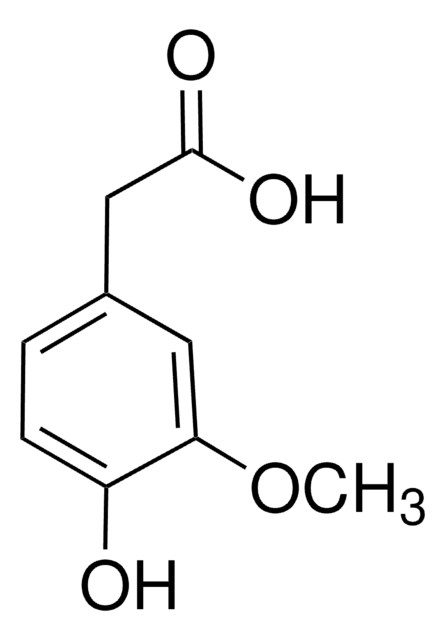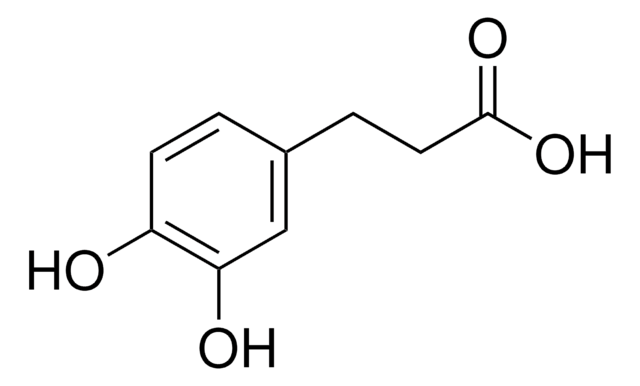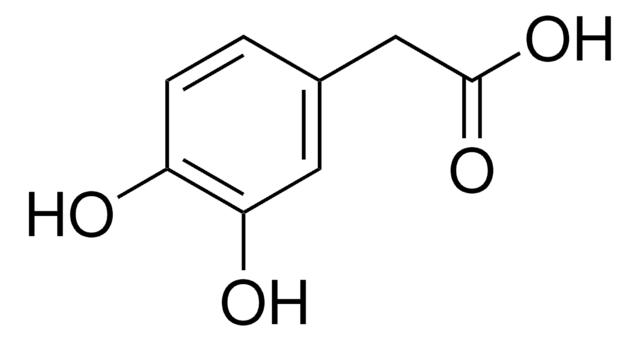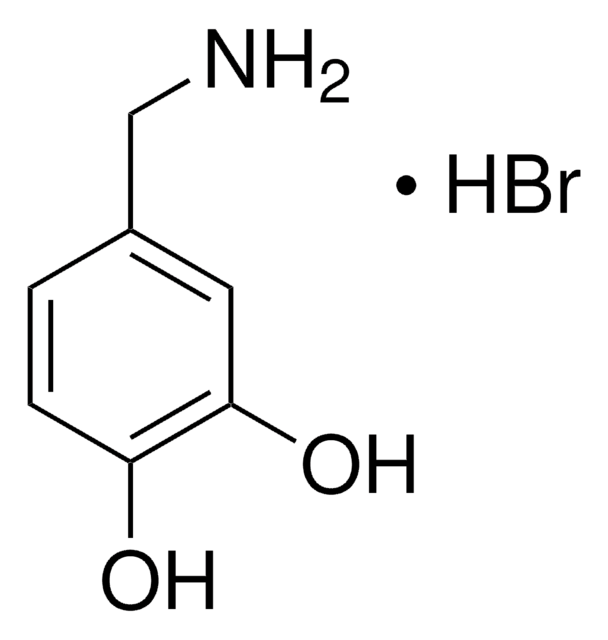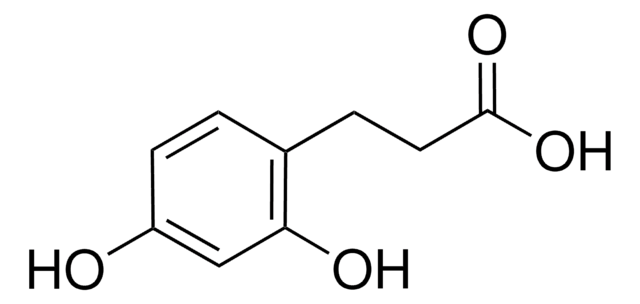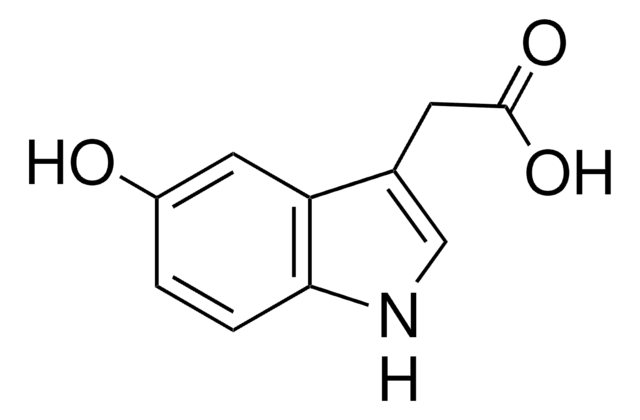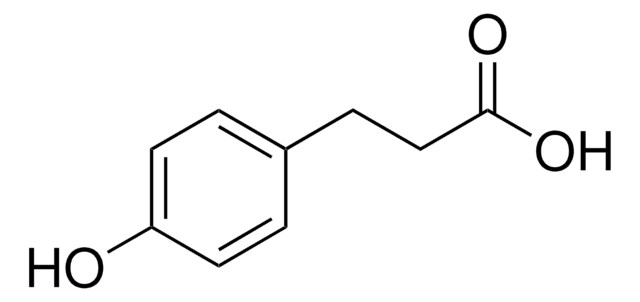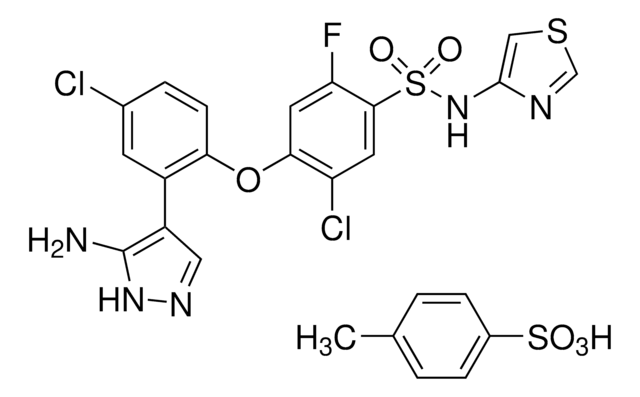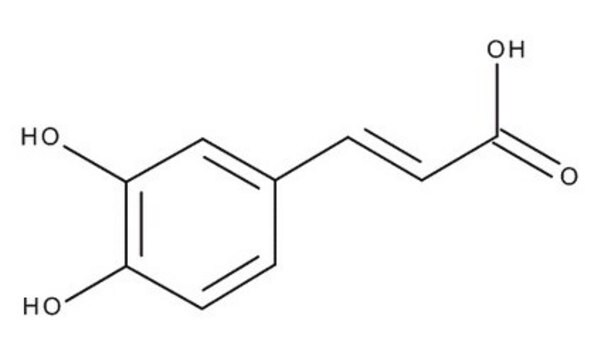850217
3,4-Dihydroxyphenylacetic acid
98%
Synonym(s):
DOPAC, Homoprotocatechuic acid
Sign Into View Organizational & Contract Pricing
All Photos(1)
About This Item
Linear Formula:
(HO)2C6H3CH2CO2H
CAS Number:
Molecular Weight:
168.15
Beilstein:
2211017
EC Number:
MDL number:
UNSPSC Code:
12352100
PubChem Substance ID:
NACRES:
NA.22
Recommended Products
Quality Level
Assay
98%
form
powder
mp
127-130 °C (lit.)
solubility
water: soluble 50 mg/mL, clear, almost colorless
functional group
carboxylic acid
SMILES string
OC(=O)Cc1ccc(O)c(O)c1
InChI
1S/C8H8O4/c9-6-2-1-5(3-7(6)10)4-8(11)12/h1-3,9-10H,4H2,(H,11,12)
InChI key
CFFZDZCDUFSOFZ-UHFFFAOYSA-N
Looking for similar products? Visit Product Comparison Guide
General description
3,4-dihydroxyphenylacetic acid (DOPAC) is a normal constituent of rat brain tissue. A mass fragmentographic method for determination of DOPAC in rat brain tissue has been described. It is major metabolite of dopamine (DA). The voltammetric reduction of DOPAC has been studied at a glassy carbon electrode modified with single-wall carbon nanotubes (SWNTs). Semi-automatic fluorometric assay technique for DOPAC has been reported.
Application
3,4-Dihydroxyphenylacetic acid may be employed as ligand in the preparation of Mo(VI) complexes.
Signal Word
Warning
Hazard Statements
Precautionary Statements
Hazard Classifications
Eye Irrit. 2 - Skin Irrit. 2
Storage Class Code
11 - Combustible Solids
WGK
WGK 3
Flash Point(F)
Not applicable
Flash Point(C)
Not applicable
Personal Protective Equipment
dust mask type N95 (US), Eyeshields, Gloves
Choose from one of the most recent versions:
Already Own This Product?
Find documentation for the products that you have recently purchased in the Document Library.
Customers Also Viewed
A Y Deutch et al.
Brain research, 333(1), 143-146 (1985-04-29)
The effects of stress on dopamine (DA) metabolism in the mesencephalic DA cell body areas and DA terminal field regions were examined. Both mild footshock stress and exposure to a neutral stimulus previously paired with footshock resulted in a selective
B H Westerink et al.
European journal of pharmacology, 38(2), 281-291 (1976-08-01)
A concurrent semi-automatic fluorometric assay technique for 3,4-dihydroxyphenylacetic acid (DOPAC) and homovanillic acid (HVA), is described. The method is based on a rapid manually performed isolation of DOPAC and HVA on small columns of Sephadex G-10 followed by an automated
Electrocatalytic oxidation of 3, 4-dihydroxyphenylacetic acid at a glassy carbon electrode modified with single-wall carbon nanotubes.
Wang J, et al.
Electrochimica Acta, 47(4), 651-657 (2001)
Molybdenum catecholates as models for Mo in biological systems. 1. Synthesis and spectroscopic study on Mo complexes with 3, 4-dihydroxybenzoic and 3, 4-dihydroxyphenylacetic acid.
Karaliota A, et al.
Journal of Inorganic Biochemistry, 69(1), 79-90 (1998)
Simultaneous mass fragmentographic determination of 3, 4-dihydroxyphenylacetic acid and 4 hydroxy-3-methoxyphenylacetic acid in brain tissue.
F A Wiesel et al.
Journal of neural transmission, 35(4), 319-326 (1974-01-01)
Our team of scientists has experience in all areas of research including Life Science, Material Science, Chemical Synthesis, Chromatography, Analytical and many others.
Contact Technical Service